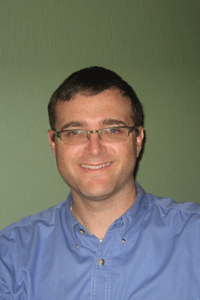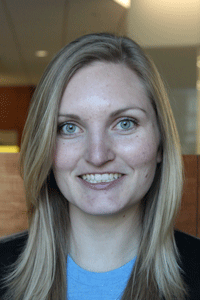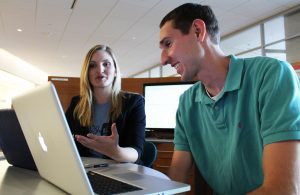Access to information technology resources, such as high-performance computing, large scale data storage, or the opportunity to collaborate with trained IT personnel, can allow researchers across disciplines to ask, and answer, new research questions and accelerate outcomes.
Several researchers at UW-Madison already use computing resources to further their research goals. But a 2011 report found while “the aggregate skills, resources and expertise are enormous…research computing at UW-Madison is difficult to navigate and in need of greater care and attention to keep [the university] competitive, agile, creative, and efficient.”
Researchers are often unaware of how best to gain access to existing core research computing resources, and university IT service providers face similar hurdles in connecting with scientists and scholars. The Advanced Computing Initiative (ACI) at UW-Madison aims to bridge these gaps.

“The ACI is trying to identify campus computing needs and allocate resources that are already here or advocate for additional resources,” says Paul Wilson, who serves as the faculty director of the ACI. While the ACI doesn’t itself provide these resources, it tries to connect researchers to “service providers” or “service partners” on campus who use resources they already have to work with researchers and provide for their research computing needs.
One of the key computing service providers the ACI has worked with is the Center for High Throughput Computing or CHTC. The CHTC offers numerous large-scale computing resources, such as high-throughput computing and expert technical services for UW-affiliated researchers and their collaborators free of charge.
Erik Wright, a graduate student with Kalin Vetsigian in the Systems Biology theme at the Wisconsin Institute for Discovery, has been working with the CHTC to advance his research goals. Wright recalls how he ran into seemingly “insurmountable problems” while pursuing his research, which involved developing software to efficiently design small DNA molecules called oligos. “The only way I could possibly achieve what I imagined in my mind was by using high throughput computing,” says Wright.
By collaborating with the CHTC Wright was able to use the HTCondor software and massively-parallel high-throughput computing to develop programs that not only allowed him to pursue his own research but develop software tools that can now be accessed by other biologists as well.
Wright says he was fortunate to be able to leverage the CHTC as a research computing resource, but acknowledges a need for a more established way to connect researchers and computing service providers. “I had no idea what to do but fortunately I ended up running into the right people at the right time,” says Wright.
“The only way I could possibly achieve what I imagined in my mind was by using high throughput computing.”
-Erik Wright.
That’s where Lauren Michael hopes the ACI can make a big difference. Michael, who works as a Research Computing Facilitator, works with faculty from myriad disciplines to work out ways in which research computing may be able to help them answer important research questions or even ask new ones.

“We needed people who are well poised to help researchers leverage computing resources for existing research, and pursue research tracks they wouldn’t have considered because they didn’t see the possibilities that computing could bring,” says Michael.
One such researcher is Chris Cox, a graduate student in Cognitive Psychology with Tim Rogers, who uses functional Magnetic Resonance Imagining, or MRIs, to study how we represent meaning in our brains.
Cox’s research involves trying to understand how our brains break up the world into categories, the goal being to piece together a holistic picture of how knowledge is represented. That often requires analyzing huge volumes of MRI data, and access to the CHTC computing resource has allowed Cox to ramp up his research questions and analyses.
“We can now take into consideration the whole brain at once, not just specific locations and truly see how it all works together to generate a neural state that is representative of the brain at a point of time,” says Cox. “Without working with the CHTC, taking these steps into the more sophisticated analyses would not be possible.”
While the computing resources available through the CHTC have benefited Cox’s research greatly, he is especially grateful to the people who helped facilitate this collaboration. “A huge one-up that we have here at UW-Madison is a community of outreach, people who are really trying to make advanced research computing resources accessible to anyone who can benefit from it and not just the incredibly computationally sophisticated,” he says.
Wilson wants the ACI to facilitate exactly these kinds of collaborations between researchers and computing service providers. He emphasizes the ACI has a key role to play in making sure computing resources at UW-Madison remain accessible to all researchers across academic disciplines, irrespective of their prior computing knowledge or financial resources.
“Computing is ubiquitous in a way that no other research infrastructure is across different fields and across different domains of scholarly work,” says Wilson. “It’s important to understand what a shared facility looks like in a world where we can’t assume that everyone has a large financial resource but it’s still important they have access to the facility.”
 As computing technologies continue to be developed and enhanced at a breathtaking rate, so do the potential for researchers to use these new technologies to further their own research. “We have some researchers who are getting 10 years of computing done in a single day,” says Wilson.
As computing technologies continue to be developed and enhanced at a breathtaking rate, so do the potential for researchers to use these new technologies to further their own research. “We have some researchers who are getting 10 years of computing done in a single day,” says Wilson.
The ACI is striving to make sure the faculty members, post-docs and students who make UW-Madison one of the most productive research universities in the world continue to have access to the latest computing technologies, and people who can help the researchers use these resources.
These plans include making sure there is a home for strategic thinking about research computing at UW-Madison and hiring a Research Computing Officer for the campus.
“What I am really hoping for is to keep abreast of where the strategic needs will be,” says Wilson, “and make sure our campus is looking out for those before they becomes crises.”
Are you a researcher curious about research computing at UW-Madison and how it could further your research goals? Do you provide a research computing service and are looking for ways to connect with researchers? To learn more about the ACI and research computing at UW-Madison please visit the ACI website or contact Lauren Michael.
–Adityarup Chakravorty


You must be logged in to post a comment.